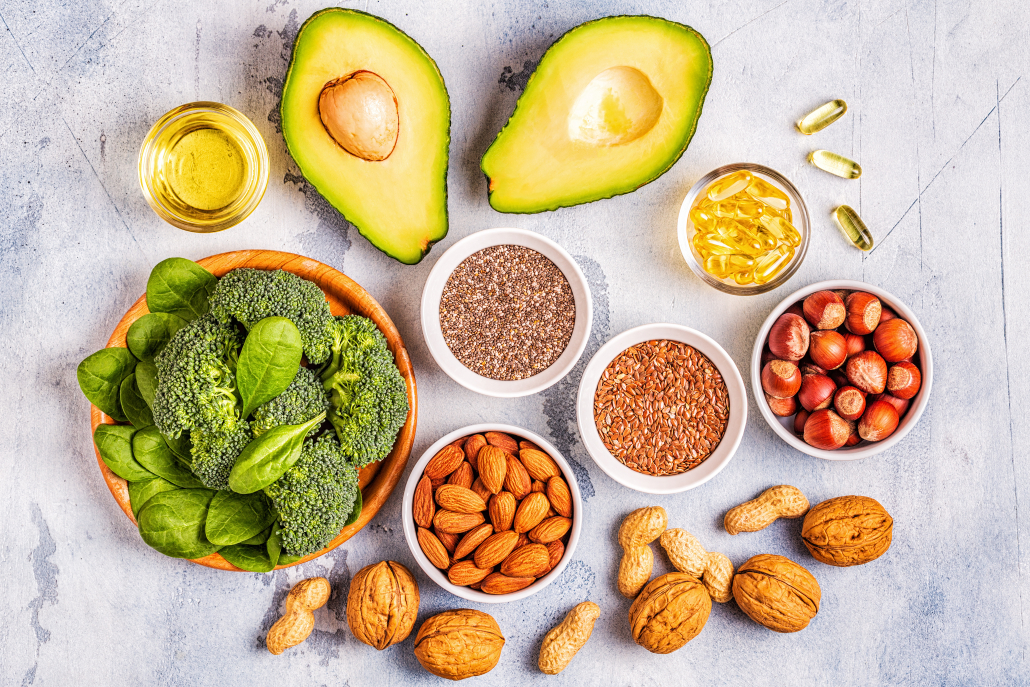There’s a chance that you’ve heard of relatives and friends trying this keto-style diet. It’s a strict and high-fat diet, with different levels of protein, and generally low amounts of carbohydrates.
It was originally employed as a treatment option for epilepsy in children that was drug-resistant to lessen seizures during the 1920s. It’s still being used to stop seizures within the U.S. when medications alone don’t suffice. But it could also aid in losing weight if you follow the plan for the long run. It could also offer other health benefits associated with weight loss.
If you’re unsure if the keto diet is right for you, our registered dietitians provide an explanation of the keto diet along with its pros and cons.
What is the ketogenic diet?
The ketogenic diet, also known as keto, involves eating high-fat and low-carbohydrate meals to achieve the state of ketosis. In ketosis, the body utilizes fat for energy in place of sugar (glucose). The result is acids, referred to as ketones.
What are the primary guidelines for ketosis?
There are many different kinds of keto-based diets. Each requires different quantities of protein, fat, and carbs per day.
Traditional Keto Diet
It’s the most original and the most studied of all diets. It is recommended to seek out an experienced dietitian since it is the strictest and difficult diet to adhere to.
- This diet is extremely high in fat and very low in carbohydrates, and lacking in protein.
- All food items must be weighed on a scale in order to reach an appropriate proportion of about 4 grams of fat per gram of carbohydrates and protein consumed throughout the day. This means you’ll likely have to be careful of foods that are high in carbs (like pasta and potatoes, fruits, and so on). In addition, for every portion of protein-rich foods, you should consume 4 servings of fat foods (heavy cream, avocado, olive oil, full-fat cheese, etc. ).
- A typical meal may appear like a half avocado with a small portion of salmon boiled in lots of olive oil, and the addition of a salad. The whole thing is served with a cream sauce made of heavy cream cheese. You will need to consume all the creams and oils.
The Keto Diet Modified
This is a modified version of the keto diet, which allows for the addition of a little more protein and carbs.
- It is still a requirement to have an instrument for weighing food items. It’s defined as the ratio of around three grams of fat to every gram of carbohydrates and protein (generally with the emphasis on more protein than carbohydrates). That means you’ll remain away from most carb-rich food items with the exception of perhaps a couple of portions each day. For every portion of high-protein or carb-rich food item, you’ll require three servings of very fat-rich food items.
Modified Atkins Diet
The keto diet is the most accessible keto diet, and it’s likely the most well-known. It’s a low-fat, high-fat diet that allows you to consume as the amount of protein as you’d like.
Find out how registered dietitians are able to assist you with health-related eating and lifestyle adjustments
What foods are permitted on the ketogenic diet?
Here’s a list of the most common foods you can eat while following your ketogenic diet.
- Dairy alternatives that are not sweetened, like full-fat cheese, plain yogurt, with full-fat cottage cheese, are unsweetened dairy products made from plants.
- Low-carb vegetables include peppers, leafy greens, and broccoli.
- Other plant-based foods include nuts, seeds, avocados, and avocados.
- Fats and oils such as coconut oil and olive oil, along with whole avocados and olives.
- Moderate portions of high-protein food items like seafood, poultry, meat, and eggs.
- Sometimes, small amounts of berries may be consumed.
They generally stay clear of any starchy food items (pasta, rice, potato, corn, beans, peas as well as beans). Desserts, as well as other high-carb food items, are not included in the diet. Sometimes, fruits can be added if they are rich in fiber, for instance, raspberries.
What are the benefits and drawbacks of being in ketosis?
Here are a few benefits of ketosis for your well-being:
- Aids with weight loss: Studies suggest that keto diets help people lose weight because it doesn’t contain numerous foods that people tend to eat too much of. However, it’s difficult to leave the keto diet and not gain weight. This is because people tend to start eating more carb-laden foods. A few studies suggest that switching from keto diet and moving to MIND or the Mediterranean or Mediterranean diet (or MIND) diet can aid in maintaining a healthy weight once goals for weight loss are met.
- Helps those with Type 2 Diabetes: Some people who suffer from diabetes discover that reducing their intake of carbohydrates could help in the management of blood sugar and medications.
- Management of epilepsy: Research has shown that keto diets may benefit people who suffer from epilepsy by reducing seizures.
The negatives that ketosis has include:
- Could lead to nutrient deficiency: The keto diet is very low in carbohydrates, which means you don’t have plenty of vegetables and fruits. It can cause lower levels of vitamins B6, A, E, as well as B6 and folate and magnesium, calcium, and potassium.
- Potentially negative impacts on heart health: The results are not always clear from studies that study the effects specific to eating keto on health. This could be because a large part of it is dependent on the food choices of each individual. Most commonly, foods rich in saturated fats as well as an excessively fat-laden diet, can have adverse effects on the heart health indicators like your lipid profile.
- Constipation as well as other digestive (GI) problems: Constipation is most likely to be the biggest long-term side effect of ketogenic diets because of a deficiency in fiber. Fiber is a type of carb that is absorbed not by human cells, but rather by the microbes that live in our intestines. Foods high in fiber (like beans or whole grains and some fruit) are also loaded with carbs, and are not usually included in the keto diet. A diet that is lacking in fiber (including the standard Western diet) could put you at risk of certain types of cancer, such as colon cancer..
What potential side effects might this ketogenic diet cause?
Before you begin your ketogenic diet, have a blood test done to check your lipids. Then, you should take another blood test within three to six months of your keto-friendly diet.
Certain people may discover that their high-density lipoproteins (HDL), which is the good cholesterol, rise while their triglycerides drop. However, some individuals won’t notice an improvement in these markers and might see the low-density lipoproteins (LDL) (the bad cholesterol) rise and reach unhealthy levels.
There are issues regarding bone health when people change to keto-like low-carb diets. Researchers have found that bone breakdown markers are greater, while markers for bone growth are lower. This is a frequent reaction in children who are on keto diets to treat epilepsy..
Additionally, when people begin following the keto lifestyle, they suffer from keto flu. Keto influenza. The symptoms of keto flu are evident just a few days after beginning the keto diet. The symptoms will disappear once your body is accustomed to the diet changes. The keto diet are also more likely to lose sodium or salt than those following the higher-carb diet. They also might require more salt than a normal person.
The majority of people who adhere to the strict keto diet must take a multivitamin containing minerals to make sure they’re taking care of their mineral and vitamin needs. The keto diet is generally not sufficient.
Does keto improve memory and learning, among other brain functions?
The keto diet could show positive effects in aiding the brain. It’s been utilized for many years in the treatment of seizures. Researchers are trying to determine whether the keto diet could aid in treating the decline of brain function caused by age and possibly Alzheimer’s disease. There are a variety of opinions regarding whether the keto diet could help people suffering from neuromuscular disorders like Parkinson’s disease..
There are numerous theories on why keto-based diets can be beneficial to brain health. They include the direct benefits of the presence of ketone bodies, specifically one known as beta-hydroxybutyrate. There are other theories that suggest a beneficial effect of changing the microbiome in certain conditions, such as epilepsy.
Does the keto diet work for athletes?
Our bodies utilize multiple energy systems for exercise. The kind of energy system utilized is based on the intensity of exercise and duration. At lower intensity, our bodies rely on the combination of burning fat and carbs to provide fuel. When we shift to higher intensity (such as for a workout that is scheduled), our bodies begin to rely on carbs for fuel.
The majority of studies on endurance athletes found that the keto diet is detrimental to their performance. Keto diets have been proven to cause more loss of lean tissue compared to the higher-carb diet.
The conclusion is that ketosis hinders athletic performance and is not advised for athletes due to the fact that it limits carbs.
What other meal plans might be suitable for me?
The ketogenic diet may not seem to be the ideal option for you, perhaps you should consider alternative eating plans.
Periodic fasting
The trend of losing weight dates from the beginning of time, when fasting is believed to help heal the body. The concept of intermittent fasting is that by limiting the intake of food, our bodies be more efficient in tapping into the fat stores for energy. It’s not a strict eating plan that specifies what kinds of food items to consume, but rather focuses on the time to consume food. There are many ways to practice intermittent fasting.
The Mediterranean diet
The diet of this type concentrates upon whole plant food and healthy fats. It is a healthy way to eat. Mediterranean eating techniques have been scientifically proven to decrease the risk of developing chronic diseases such as heart disease.
The Mind Diet
The term “short short for ” Mediterranean-DASH Intervention for Neurodegenerative Delay.” The Mediterranean-DASH diet is like the Mediterranean diet; however, it has stricter guidelines regarding what foods you can consume. It encourages you to eat more fruits, vegetables, and vegetables (specifically), as well as high-fiber foods like seafood, beans, nuts, as well as poultry, and olive oil. The MIND diet may aid in reducing cognitive decline that is a result of age. It can also help slow the progression of diseases like Parkinson’s disease.

